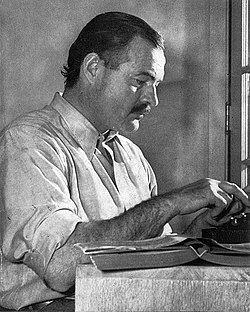Ernest Hemingway Quote
He was completely detached from every thing except the story he was writing and he was living in it as he built it. The difficult parts he had dreaded he now faced one after another and as he did the people, the country, the days and the nights, and the weather were all there as he wrote. He went on working and he felt as tired as if he had spent the night crossing the broken volcanic desert and the sun had caught him and the others with the dry gray lakes still ahead. He could feel the weight of the heavy double-barreled rifle carried over his shoulder, his hand on the muzzle, and he tasted the pebble in his mouth. Across the shimmer of the dry lakes he could see the distant blue of the escarpment. Ahead of him there was no one, and behind was the long line of porters who knew that they had reached this point three hours too late.It was not him, of course, who had stood there that morning, nor had he even worn the patched corduroy jacket faded almost white now, the armpits rotted through by sweat, that he took off then and handed to his Kamba servant and brother who shared with him the guilt and knowledge of the delay, watching him smell the sour, vinegary smell and shake his head in disgust and then grin as he swung the jacket over his black shoulder holding it by the sleeves as they started off across the dry-baked gray, the gun muzzles in their right hands, the barrels balanced on their shoulders, the heavy stocks pointing back toward the line of porters.It was not him, but as he wrote it was and when someone read it, finally, it would be whoever read it and what they found when they should reach the escarpment, if they reached it, and he would make them reach its base by noon of that day; then whoever read it would find what there was there and have it always.
He was completely detached from every thing except the story he was writing and he was living in it as he built it. The difficult parts he had dreaded he now faced one after another and as he did the people, the country, the days and the nights, and the weather were all there as he wrote. He went on working and he felt as tired as if he had spent the night crossing the broken volcanic desert and the sun had caught him and the others with the dry gray lakes still ahead. He could feel the weight of the heavy double-barreled rifle carried over his shoulder, his hand on the muzzle, and he tasted the pebble in his mouth. Across the shimmer of the dry lakes he could see the distant blue of the escarpment. Ahead of him there was no one, and behind was the long line of porters who knew that they had reached this point three hours too late.It was not him, of course, who had stood there that morning, nor had he even worn the patched corduroy jacket faded almost white now, the armpits rotted through by sweat, that he took off then and handed to his Kamba servant and brother who shared with him the guilt and knowledge of the delay, watching him smell the sour, vinegary smell and shake his head in disgust and then grin as he swung the jacket over his black shoulder holding it by the sleeves as they started off across the dry-baked gray, the gun muzzles in their right hands, the barrels balanced on their shoulders, the heavy stocks pointing back toward the line of porters.It was not him, but as he wrote it was and when someone read it, finally, it would be whoever read it and what they found when they should reach the escarpment, if they reached it, and he would make them reach its base by noon of that day; then whoever read it would find what there was there and have it always.
Related Quotes
About Ernest Hemingway
Hemingway was raised in Oak Park, Illinois, a suburb of Chicago. After high school, he spent six months as a reporter for The Kansas City Star before enlisting in the Red Cross. He served as an ambulance driver on the Italian Front in World War I and was seriously wounded by shrapnel in 1918. In 1921, Hemingway moved to Paris, where he worked as a foreign correspondent for the Toronto Star and was influenced by the modernist writers and artists of the "Lost Generation" expatriate community. His debut novel, The Sun Also Rises, was published in 1926. In 1928, Hemingway returned to the U.S., where he settled in Key West, Florida. His experiences during the war supplied material for his 1929 novel A Farewell to Arms.
In 1937, Hemingway went to Spain to cover the Spanish Civil War, which formed the basis for his 1940 novel For Whom the Bell Tolls, written in Havana, Cuba. During World War II, Hemingway was present with Allied troops as a journalist at the Normandy landings and the liberation of Paris. In 1952, his novel The Old Man and the Sea was published to considerable acclaim, and won the Pulitzer Prize for Fiction. On a 1954 trip to Africa, Hemingway was seriously injured in two successive plane crashes, leaving him in pain and ill health for much of the rest of his life. He committed suicide at his house in Ketchum, Idaho, in 1961.
